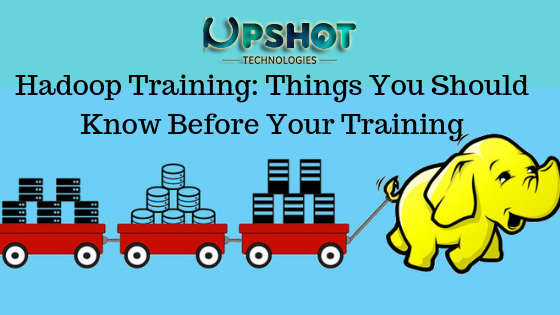Things You Should Know Before Your Training About Big Data hadoop

You must have heard that Hadoop training can offer you an advantageous career with boundless opportunities in Big Data. Keep reading this article as I take you over the risk and hurdles that you might face before, during or after your Hadoop training.
Leveraging the learning curve
Like other domains, the web is filled with resources to help you and to analyze your learning. While an Learn Giant Hadoop training course in Bangalore will teach you the basics, you can speed up your learning through open-ended community conversations and leverage your learning with available resources online and from trainer side also.
However, all of these come into the sight only after you have started learning. Before you begin with your Hadoop training, it is important to analyze what technologies you want to learn and why. You can check our previous article on choosing a Hadoop training course to give a direction to your thoughts.
I will assume that you are decided upon getting a Hadoop training. So, what is the real picture?
Hadoop is a paradigm-shifting technology that shapes you to do things like data compilation and analysis. Keep in Mind, here it is not a single data set but vast stores of data. Seemingly impossible, but knowledge in Hadoop make it. The next obvious question: What to analyze? It can be anything so and so – it can be customer behavioral patterns, or personalized ad targeting, or creating a marketing budget.
The argument is that Hadoop helps in data analysis and in making an informed business decision is not enough for this technology. Other technologies have been doing the same thing in the market thing. Then why do Hadoop training? Why not learn other?
The answer to this remaining question is that Hadoop performs all these tasks in minutes or hours with no cost as compared to other technologies. When you club Hadoop with twice as many worker nodes, your processing time increases 2X. Over a time, Hadoop has become the single business solution when all are looking for fast and reliable processing of large data sets without crossing their budget.
For instance, The New York Times use Hadoop to convert approximately 4 million entities to PDF in less than 36 hours? Yep. Hadoop is that fast!
Analyzing the Hadoop training course material
Before you enroll for a Hadoop training course with Learn Giant in Bangalore, it is important you go over the course syllabus to be sure that it covers the important facets of Hadoop. Although I am very sure every other Hadoop training course syllabus follows the architectural model of Hadoop, it is better to be sure.
To tell it more ease, HDFS and MapReduce are two factors of Hadoop that make up this entire technology. HDFS or Hadoop Distributed File System helps in splitting, managing and distributing large chunks of data. These could be in single file or directories. HDFS saves you from handling data back and forth across the network.
MapReduce twist each worker node to which the data is loaded. It can either Map (i.e., locality-based data assign) or Reduce (i.e., aggregate the output). These two programs work together to produce a sensible output.
Any Hadoop course syllabus that does not focus on these two deeply may not benefit you in the longer run.
Next OS and programming requirements. I am afraid, Hadoop training is not for someone who has no idea about programming or is blank regarding various OS.
Hadoop is written in Java; Map and Reduce functionalities. If your knowledge of Java is not good, you might first want to brush it up before you start with your Hadoop Training (especially your Object Oriented Skills).
For your knowledge, Hadoop runs well on Windows OS, but originally Hadoop was built on Linux. You must know that the Cloudera Distribution of Hadoop (CDH) is officially only supported on Linux derivatives like RedHat and Ubuntu. So, if you want to excel with Hadoop, you might want to go over the Linux derivatives. In case you don’t know where to start, you can opt for a quick (but thorough) read of any Linux for dummies books.
For any other queries or confusions, you can write to us directly or post it in the comments below.

 WhatsApp Us
WhatsApp Us